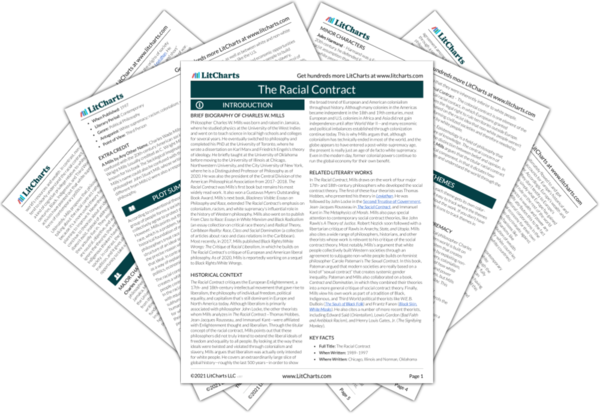Immanuel Kant Quotes in The Racial Contract
It would be a fundamental error, then—a point to which I will return—to see racism as anomalous, a mysterious deviation from European Enlightenment humanism. Rather, it needs to be realized that, in keeping with the Roman precedent, European humanism usually meant that only Europeans were human. European moral and political theory, like European thought in general, developed within the framework of the Racial Contract and, as a rule, took it for granted.
There is also the evidence of silence. Where is Grotius’s magisterial On Natural Law and the Wrongness of the Conquest of the Indies, Locke’s stirring Letter concerning the Treatment of the Indians, Kant’s moving On the Personhood of Negroes, Mill’s famous condemnatory Implications of Utilitarianism for English Colonialism, Karl Marx and Frederick Engels’s outraged Political Economy of Slavery? Intellectuals write about what interests them, what they find important, and—especially if the writer is prolific—silence constitutes good prima facie evidence that the subject was not of particular interest. By their failure to denounce the great crimes inseparable from the European conquest, or by the halfheartedness of their condemnation, or by their actual endorsement of it in some cases, most of the leading European ethical theorists reveal their complicity in the Racial Contract.

Immanuel Kant Quotes in The Racial Contract
It would be a fundamental error, then—a point to which I will return—to see racism as anomalous, a mysterious deviation from European Enlightenment humanism. Rather, it needs to be realized that, in keeping with the Roman precedent, European humanism usually meant that only Europeans were human. European moral and political theory, like European thought in general, developed within the framework of the Racial Contract and, as a rule, took it for granted.
There is also the evidence of silence. Where is Grotius’s magisterial On Natural Law and the Wrongness of the Conquest of the Indies, Locke’s stirring Letter concerning the Treatment of the Indians, Kant’s moving On the Personhood of Negroes, Mill’s famous condemnatory Implications of Utilitarianism for English Colonialism, Karl Marx and Frederick Engels’s outraged Political Economy of Slavery? Intellectuals write about what interests them, what they find important, and—especially if the writer is prolific—silence constitutes good prima facie evidence that the subject was not of particular interest. By their failure to denounce the great crimes inseparable from the European conquest, or by the halfheartedness of their condemnation, or by their actual endorsement of it in some cases, most of the leading European ethical theorists reveal their complicity in the Racial Contract.











